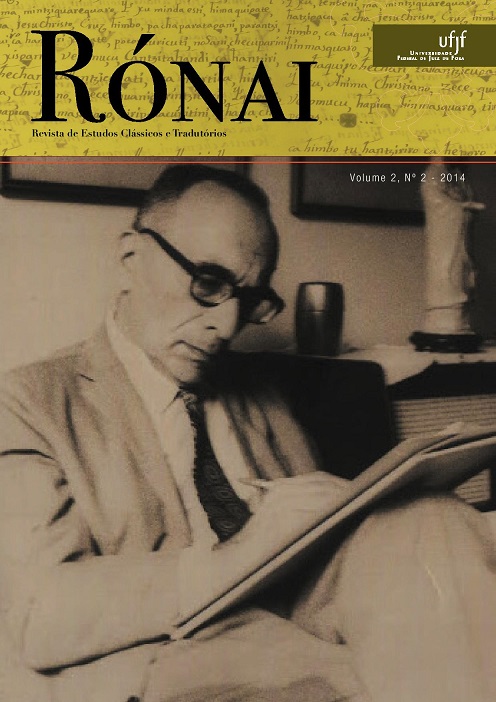Institutio oratoria VI, 2: poésie et rhétorique dans la péroraison
Keywords:
Poesia, retórica, Institutio oratoria, QuintilianoAbstract
Quintilien, dans les premières lignes du chapitre II du sixième livre de l’Institutio Oratoria, nous montre deux aspects de l’activité judiciaire qui doivent être déjà présents dans la formation des orateurs : 1) πάθος, appelé en latin adfectus, comprendre les travaux de l’ordre des passions et des émotions et 2) le deuxième, ἔθος, pour Quintilien, n’a pas d’équivalent dans la langue latine, cependant assume la teneur qui pondèrent sur du caractère et de la morale, donc, il peut être traduit pour mores. Dans le forum, en employant les passions, l’orateurs devront représenter l’infortune expérimenté par leur client en utilisant les uisiones, technique, appelée par les Grecs φαντασία, qui consiste à représenter dans l’esprit les images de choses absent, afin de générer l’excitation et disposer le juge en faveur de la cause défendue. Notre intérêt est d’observer comment Quintilien rassemble ces contributions dans son texte et le traitement de ce sujet dans son travail sur la base des six extraits de l’Enéide utilisés dans le deuxième chapitre.
Downloads
References
CÍCERO. Retórica a Herênio. Trad. de Ana Paula Celestino Faria e Adriana Seabra. São Paulo: Hedra, 2005.
LEIGH, Matthew. Quintilian on the Emotions (Institutio Oratoria 6 Preface and 1-2). The Journal of Roman Studies, Vol. 94, 2004, pp. 122-140.
SCATOLIN, Adriano. A invenção no ‘De orador’ de Cícero: um estudo à luz de ‘Ad Familiares’ I, 9, 23. Tese de Doutorado. São Paulo: Faculdade de Filosofia, Letras e Ciências Humanas, 2009.
QUINTILIANO. Istituzione oratória. Ed. Simone Beta & Elena D’Incerti Amadio.Milão: Mondadori, 1997.
VIRGÍLIO. Eneida. Trad. Agostinho da Silva. (In Virgilio, Obras, trad. Agostinho da Silva, Lisboa, Temas e Debates, 1997) Disponível em http://en.calameo.com/read/000039711f5828b409b20
Downloads
Published
How to Cite
Issue
Section
License
Copyright (c) 2015 Rónai – Revista de Estudos Clássicos e Tradutórios

This work is licensed under a Creative Commons Attribution 4.0 International License.
Copyright
The authors of the published contributions agree with the following items:
1. The authors keep the copyright and convey to the journal the right of first publication, the work being licensed under a Creative Commons Attribution License 4.0 International.
2. The authors are allowed and stimulated to publicize and distribute their work online after the publication in the journal, recognizing first publication in this journal.
3. The authors of the approved works authorize the journal to distribute their content, after publication, for reproduction in content indexes, virtual libraries and similars.
For more information about Creative Commons Attribution License 4.0 International, please, go to: https://creativecommons.org/licenses/by/4.0/deed.en
Editorial exemption
The authors of the published contributions are entirely and exclusively responsible for their contents. Its content does not represent an official position of Rónai - Revista de Estudos Clássicos e Tradutórios neither of Faculdade de Letras da Universidade Federal de Juiz de Fora or their partner institutions.



